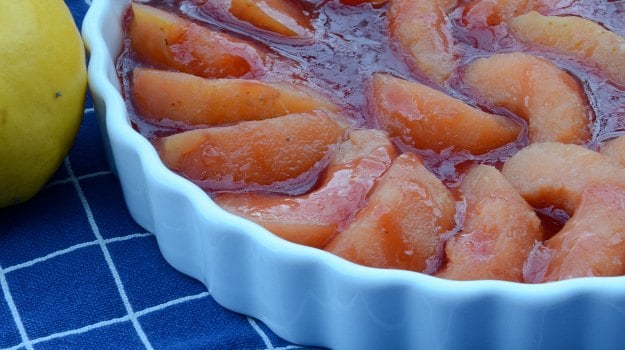As I set out to poach a few, I pondered some kitchen mythologies about quinces as well. They do not need to be cooked for hours to soften them. As little as 30 minutes will sometimes do, although longer cooking does transform their pale color to vivid rose. They don't need their weight in sugar added. A half cup of honey in the water will lend ample sweetness to a pound of fruits. And they are not hard to prep. The slightly sooty film that quinces may have when harvested comes off with a light scrub. They're no harder to peel than a winter squash, and the peel, if cooked, is no less tender than that of a baked apple. After quartering them with a large knife, the tip of a small knife one will easily pry out the seedy little nut-shaped core.
I cut my quinces in eighths and simmered them in a biggish skillet, well-covered with water and with the lid slightly ajar. When they were soft and shrimp-colored I fished them out to drain, and arranged them in a circle in a dish, where they looked even more like shrimp. Then I boiled down the poaching liquid, which rapidly thickened into a vivid red syrup, rich in the pectin that made quinces famous - until they became unknown. (Before Mr. Knox put pectin into little packets, one thickened one's jams and jellies with a bit of quince.) This I poured over the slices, which bonded them so quickly and well that I served them cut in wedges as a dessert, along with a dollop of thick cream. I'd made a list of possible additions to this simple recipe, including Grand Marnier and candied ginger, but apart from a few whole cloves in the water I was happy to let the quince flavor shine.
You do not have to live in Connecticut to cultivate the quince, which grows on a conveniently small, spreading tree, long-lived and gnarly - in a picturesque way - in advanced age. It's happy in hardiness zones 5 through 9, in full sun and well-drained soil. It's self-fertile, though a companion quince is said to make it bear more heavily. Susceptibility to fire blight is an issue in warm climates, best prevented by avoiding too much nitrogen, which can lead to weak growth. Meanwhile, my poached dish will soon accompany a large turkey, maybe with a few cranberries added? I think not. Let them eat quince.© 2015 The Washington Post










